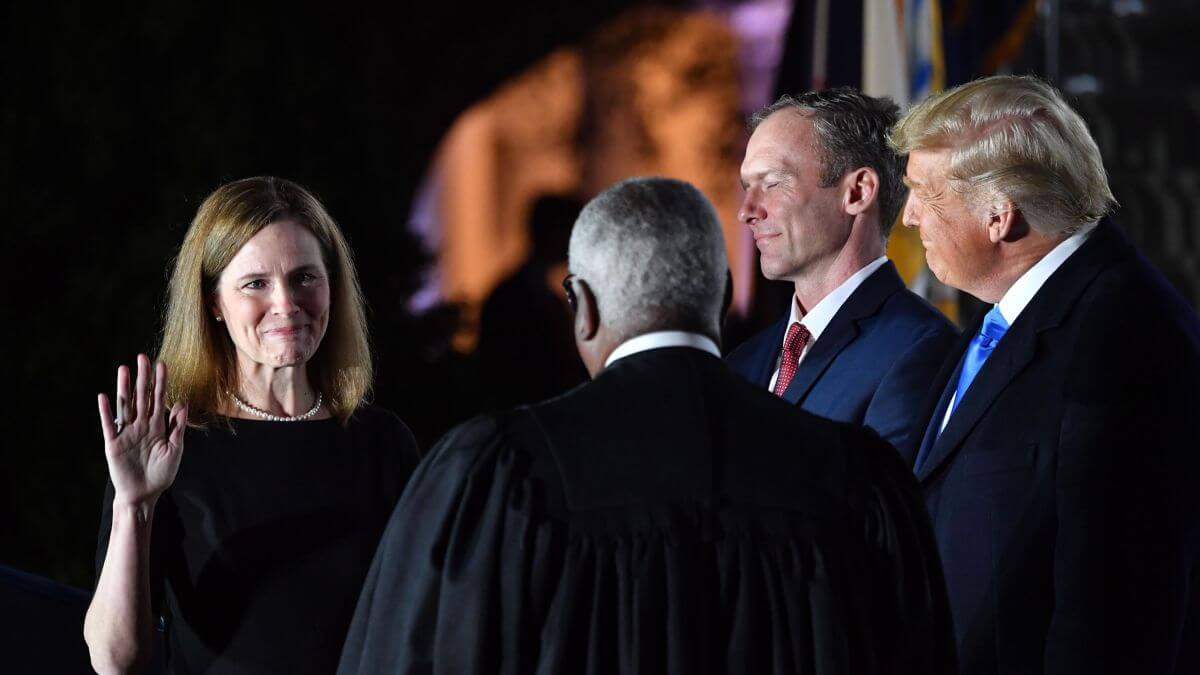The United States (US) Senate on Monday night confirmed President Donald Trump’s pick Amy Coney Barrett to the Supreme Court, despite universal opposition from the Democratic party. She was sworn in on Tuesday morning in the East Conference Room of the court in a ceremony administered by Chief Justice John Roberts.
No Supreme Court justice has ever been confirmed so close to a presidential election. Barrett’s lifetime appointment, just a week before the November vote, tips the high court into a long-elusive 6-3 conservative majority and is being seen as one that could significantly alter the American way of life through rulings on abortion, LGBTQ+ rights, the Affordable Care Act (ACA, also known as Obamacare) and even the upcoming general election. Democrats have vehemently criticized the GOP for rushing through the nomination due to the raging pandemic and socio-political crises engulfing the country, but also because more than 60 million Americans have already voted. The minority party has also repeatedly called the Republicans out on their blatant hypocrisy, as they had refused to consider President Barack Obama’s Supreme Court nominee, Judge Merrick Garland, eight months before the 2016 election, arguing that the American people needed to have a say in the matter.
Before the vote on Monday, Senate Minority Leader Chuck Schumer warned Republicans that their credibility was on the line. “You will never, ever get your credibility back,” he said. “And the next time the American people give Democrats a majority in this chamber, you will have forfeited your right to tell us how to run that majority. You walk a perilous road. I know you think this will eventually blow over. But you’re wrong. The American people will never forget this blatant act of bad faith.”
However, despite their resistance, the Senate voted 52-48, largely along party lines. Only Maine Senator Susan Collins, who is facing tough reelection at home voted in opposition to her party. “To be clear, my vote does not reflect any conclusion that I have reached about Judge Barrett’s qualifications to serve on the Supreme Court,” Collins said in the statement. “What I have concentrated on is being fair and consistent, and I do not think it is fair nor consistent to have a Senate confirmation vote prior to the election.
Joe Biden released a lengthy statement following the confirmation vote, urging people to get out and vote. “Vote to protect the fundamental idea that health care is a right, not a privilege. And vote for the legacy of the late Justice Ruth Bader Ginsburg,” he said. Meanwhile, Trump welcomed the decision, saying: “This is a momentous day for America, the United States Constitution and for the fair and impartial rule of law. Justice Barrett made clear she will issue rulings based solely upon a faithful reading of the law and the Constitution as written not legislate from the bench.”
During Tuesday morning’s event, Barrett said that it was a privilege to serve her country and highlighted the “separation of duty from political preference”. Since a large part of her confirmation hearings focused on her views on the ACA, immigration, and women’s sexual and reproductive rights, Barrett sought to reassure the American public that she would be a neutral arbiter, and perform her duties “without any fear or favor”, and independent of both the political branches and her own preferences.
Conservative Judge Amy Coney Barrett Sworn in as Ninth US Supreme Court Justice
No Supreme Court justice has ever been confirmed so close to a presidential election.
October 28, 2020

SOURCE: CNN
